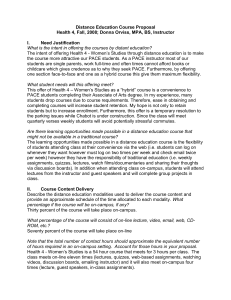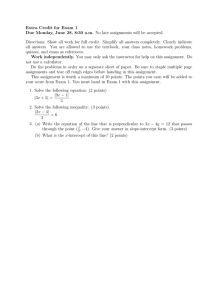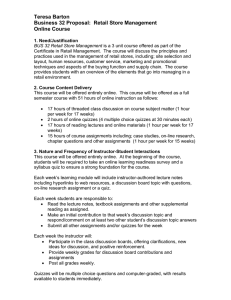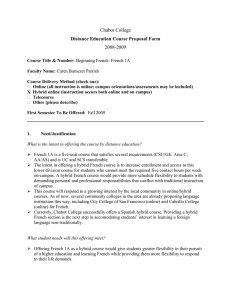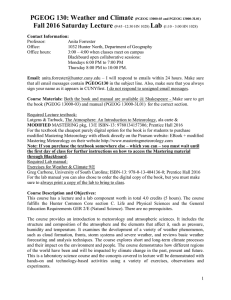Chabot College 2005-2006
advertisement
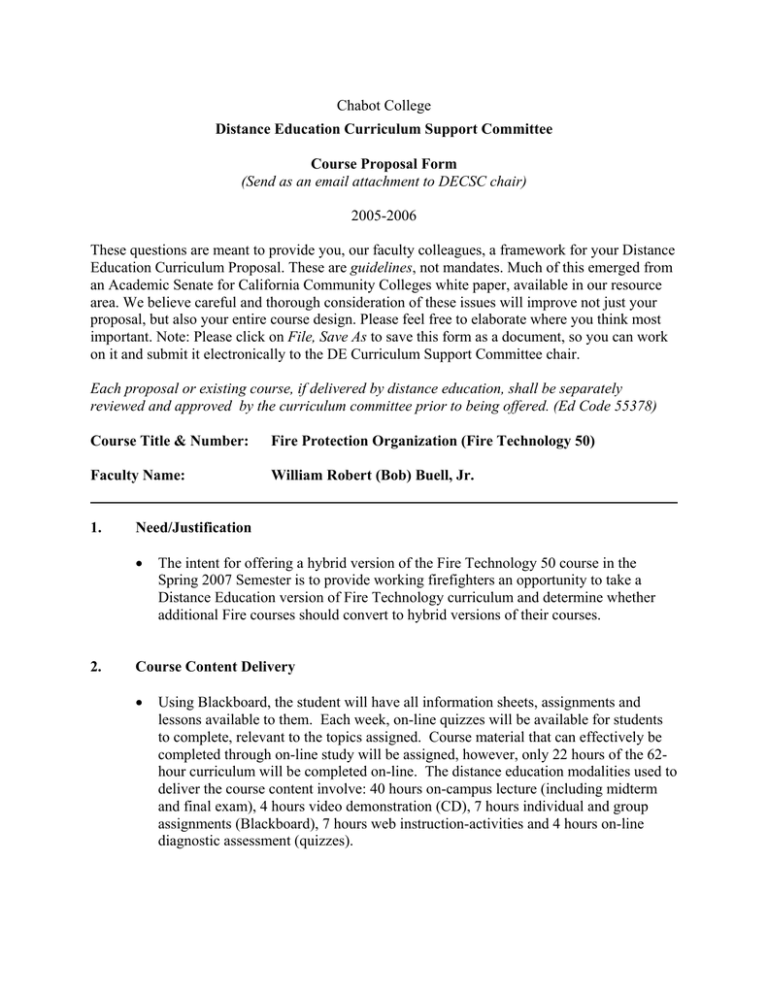
Chabot College Distance Education Curriculum Support Committee Course Proposal Form (Send as an email attachment to DECSC chair) 2005-2006 These questions are meant to provide you, our faculty colleagues, a framework for your Distance Education Curriculum Proposal. These are guidelines, not mandates. Much of this emerged from an Academic Senate for California Community Colleges white paper, available in our resource area. We believe careful and thorough consideration of these issues will improve not just your proposal, but also your entire course design. Please feel free to elaborate where you think most important. Note: Please click on File, Save As to save this form as a document, so you can work on it and submit it electronically to the DE Curriculum Support Committee chair. Each proposal or existing course, if delivered by distance education, shall be separately reviewed and approved by the curriculum committee prior to being offered. (Ed Code 55378) Course Title & Number: Fire Protection Organization (Fire Technology 50) Faculty Name: William Robert (Bob) Buell, Jr. 1. Need/Justification • 2. The intent for offering a hybrid version of the Fire Technology 50 course in the Spring 2007 Semester is to provide working firefighters an opportunity to take a Distance Education version of Fire Technology curriculum and determine whether additional Fire courses should convert to hybrid versions of their courses. Course Content Delivery • Using Blackboard, the student will have all information sheets, assignments and lessons available to them. Each week, on-line quizzes will be available for students to complete, relevant to the topics assigned. Course material that can effectively be completed through on-line study will be assigned, however, only 22 hours of the 62hour curriculum will be completed on-line. The distance education modalities used to deliver the course content involve: 40 hours on-campus lecture (including midterm and final exam), 4 hours video demonstration (CD), 7 hours individual and group assignments (Blackboard), 7 hours web instruction-activities and 4 hours on-line diagnostic assessment (quizzes). 3. Nature and Frequency of Instructor-Student Interactions • • • • 4. Assignments & Methods of Evaluation • • 5. Each assignment, whether on-campus or on-line, has assignment quizzes to complete. There will be twelve quizzes, a midterm, a trade article analysis, a group project, 10 group activities and a final examination that must be successfully completed. Through the use of on-campus quizzes, midterm and final examination, along with diagnostic quizzes, and written assignments – all scheduled on a Calendar of Events and course syllabus, the student's performance will be tracked weekly for timely intervention. Technical Support • 6. Distance education technology will involve the use of Blackboard to link lessons, assignments, discussion boards and grade reports. The students will have links to Powerpoint presentations for the on-line sessions, but will use the Discussion Boards for the Group Assignments. As a hybrid course, there are twelve on-campus class sessions over the seventeen weeks of the semester. The student will have weekly interaction with the instructor, even during the weeks that are "on-line." Grades will be posted weekly on Blackboard. Students whose scores are below the passing percentage level will be emailed a performance report with a warning. For this particular curriculum and delivery model, this course is an experiment to determine if hybrid courses are effective for Fire Technology course delivery. Since the target student is the working firefighter, I believe that this model works best because the working firefighter can directly apply the knowledge from this course in his/her job immediately, compared to the pre-service student The online assignments are designed for working firefighters, directly applicable to their current job, employer and municipality. The benefit to the student is a more individualized instruction with relevant projects, compared to the theoretical projects used for pre-service students. Blackboard will be the primary DE resource, along with a CD for the students that will contain the Powerpoint presentatons and video. I'm not sure what support personnel are required to maintain hardware & software, for both faculty and students. Student Services • Since students attending this hybrid course are still attending on-campus lecture, their access to services such as tutoring, counseling, and financial aid is the same as other on-campus students. Supporting course materials would be available through the Bookstore, and additional learning resources can be accessed through the library or the Fire Technology Coordinator's office. 7. Accommodations for Students with Disabilities • 8. Class Size & First Term to be offered • • Depending on the disability, accommodations would be handled on a case-by-case basis. The standard limit for the class is 40 for the Spring 2007 semester. Note: The Spring 2007 offering of the Fire Technology 50 course will still be taught as scheduled. We are recommending offering the opportunity to students to attend a hybrid version of the course as an option. c:\documents\word\curric\handbook2005\definalform.doc
